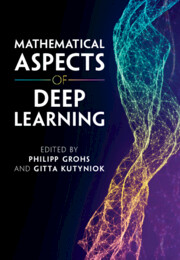Book contents
- Frontmatter
- Contents
- Contributors
- Preface
- 1 The Modern Mathematics of Deep Learning
- 2 Generalization in Deep Learning
- 3 Expressivity of Deep Neural Networks
- 4 Optimization Landscape of Neural Networks
- 5 Explaining the Decisions of Convolutional and Recurrent Neural Networks
- 6 Stochastic Feedforward Neural Networks: Universal Approximation
- 7 Deep Learning as Sparsity-Enforcing Algorithms
- 8 The Scattering Transform
- 9 Deep Generative Models and Inverse Problems
- 10 Dynamical Systems andOptimal Control Approach to Deep Learning
- 11 Bridging Many-Body Quantum Physics and Deep Learning via Tensor Networks
1 - The Modern Mathematics of Deep Learning
Published online by Cambridge University Press: 29 November 2022
- Frontmatter
- Contents
- Contributors
- Preface
- 1 The Modern Mathematics of Deep Learning
- 2 Generalization in Deep Learning
- 3 Expressivity of Deep Neural Networks
- 4 Optimization Landscape of Neural Networks
- 5 Explaining the Decisions of Convolutional and Recurrent Neural Networks
- 6 Stochastic Feedforward Neural Networks: Universal Approximation
- 7 Deep Learning as Sparsity-Enforcing Algorithms
- 8 The Scattering Transform
- 9 Deep Generative Models and Inverse Problems
- 10 Dynamical Systems andOptimal Control Approach to Deep Learning
- 11 Bridging Many-Body Quantum Physics and Deep Learning via Tensor Networks
Summary
We describe the new field of the mathematical analysis of deep learning. This field emerged around a list of research questions that were not answered within the classical framework of learning theory. These questions concern: the outstanding generalization power of overparametrized neural networks, the role of depth in deep architectures, the apparent absence of the curse of dimensionality, the surprisingly successful optimization performance despite the non-convexity of the problem, understanding what features are learned, why deep architectures perform exceptionally well in physical problems, and which fine aspects of an architecture affect the behavior of a learning task in which way. We present an overview of modern approaches that yield partial answers to these questions. For selected approaches, we describe the main ideas in more detail.
- Type
- Chapter
- Information
- Mathematical Aspects of Deep Learning , pp. 1 - 111Publisher: Cambridge University PressPrint publication year: 2022
- 26
- Cited by



